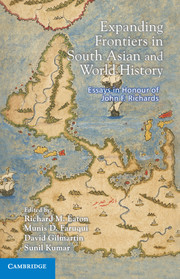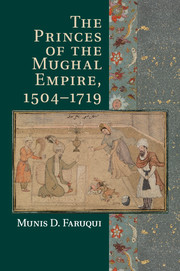33 results
Braj Bhūm in Mughal Times: The State, Peasants and Gosā’ins By Irfan Habib and Tarapada Mukherjee (late). 286 pp. New Delhi, Primus Books, 2020.
-
- Journal:
- Journal of the Royal Asiatic Society / Volume 34 / Issue 2 / April 2024
- Published online by Cambridge University Press:
- 21 February 2024, pp. 486-488
- Print publication:
- April 2024
-
- Article
-
- You have access
- HTML
- Export citation
India in the Persianate Age, 1000-1765, Richard M. Eaton , Oakland, CA: University of California Press, 2019, ISBN 978-0-5203-2512-8 (hbk), 512 pp.
-
- Journal:
- Iranian Studies / Volume 54 / Issue 3-4 / July 2021
- Published online by Cambridge University Press:
- 01 January 2022, pp. 672-676
- Print publication:
- July 2021
-
- Article
- Export citation
Contents
-
- Book:
- Expanding Frontiers in South Asian and World History
- Published online:
- 05 January 2014
- Print publication:
- 07 March 2013, pp iii-iv
-
- Chapter
- Export citation
Publications
-
- Book:
- Expanding Frontiers in South Asian and World History
- Published online:
- 05 January 2014
- Print publication:
- 07 March 2013, pp 347-351
-
- Chapter
- Export citation
List of Contributors
-
- Book:
- Expanding Frontiers in South Asian and World History
- Published online:
- 05 January 2014
- Print publication:
- 07 March 2013, pp v-x
-
- Chapter
- Export citation
Index
-
- Book:
- Expanding Frontiers in South Asian and World History
- Published online:
- 05 January 2014
- Print publication:
- 07 March 2013, pp 352-362
-
- Chapter
- Export citation

Expanding Frontiers in South Asian and World History
- Essays in Honour of John F. Richards
-
- Published online:
- 05 January 2014
- Print publication:
- 07 March 2013
Frontmatter
-
- Book:
- Expanding Frontiers in South Asian and World History
- Published online:
- 05 January 2014
- Print publication:
- 07 March 2013, pp i-ii
-
- Chapter
- Export citation
1 - At Empire's End: The Nizam, Hyderabad and Eighteenth-century India
-
-
- Book:
- Expanding Frontiers in South Asian and World History
- Published online:
- 05 January 2014
- Print publication:
- 07 March 2013, pp 1-38
-
- Chapter
- Export citation

The Princes of the Mughal Empire, 1504–1719
-
- Published online:
- 05 September 2012
- Print publication:
- 27 August 2012
Chronology
-
- Book:
- The Princes of the Mughal Empire, 1504–1719
- Published online:
- 05 September 2012
- Print publication:
- 27 August 2012, pp xiii-xvi
-
- Chapter
- Export citation
Maps and Illustrations
-
- Book:
- The Princes of the Mughal Empire, 1504–1719
- Published online:
- 05 September 2012
- Print publication:
- 27 August 2012, pp viii-viii
-
- Chapter
- Export citation
4 - Friendsand Allies
-
- Book:
- The Princes of the Mughal Empire, 1504–1719
- Published online:
- 05 September 2012
- Print publication:
- 27 August 2012, pp 134-180
-
- Chapter
- Export citation
2 - The Early Years, 1504–1556
-
- Book:
- The Princes of the Mughal Empire, 1504–1719
- Published online:
- 05 September 2012
- Print publication:
- 27 August 2012, pp 46-65
-
- Chapter
- Export citation
Introduction
-
- Book:
- The Princes of the Mughal Empire, 1504–1719
- Published online:
- 05 September 2012
- Print publication:
- 27 August 2012, pp 1-23
-
- Chapter
- Export citation
5 - Disobedience and Rebellion
-
- Book:
- The Princes of the Mughal Empire, 1504–1719
- Published online:
- 05 September 2012
- Print publication:
- 27 August 2012, pp 181-234
-
- Chapter
- Export citation
Copyright page
-
- Book:
- The Princes of the Mughal Empire, 1504–1719
- Published online:
- 05 September 2012
- Print publication:
- 27 August 2012, pp iv-iv
-
- Chapter
- Export citation
The Princes of the Mughal Empire, 1504–1719 - Half title page
-
- Book:
- The Princes of the Mughal Empire, 1504–1719
- Published online:
- 05 September 2012
- Print publication:
- 27 August 2012, pp i-ii
-
- Chapter
- Export citation
3 - Princely Households
-
- Book:
- The Princes of the Mughal Empire, 1504–1719
- Published online:
- 05 September 2012
- Print publication:
- 27 August 2012, pp 66-133
-
- Chapter
- Export citation
The Princes of the Mughal Empire, 1504–1719 - Title page
-
-
- Book:
- The Princes of the Mughal Empire, 1504–1719
- Published online:
- 05 September 2012
- Print publication:
- 27 August 2012, pp iii-iii
-
- Chapter
- Export citation

